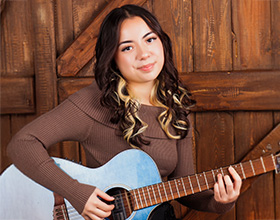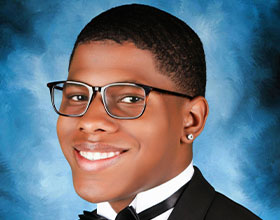Short Essay
“Why, when we say the word ‘something’ do we usually say ‘sumpthing?’”
“Umm, it’s...I don’t know. Can you explain that one again?”
"One day I just realized that I couldn’t declare anything else and that I had known that for a while. I loved kids and learning. Teaching felt like a good career for me. Nothing else seemed to fit the same."
- Madeline S.
It was late on a Monday night, and I sat next to my classmate, Jamie, at a long table on the second floor of the library. We had a linguistics quiz in the morning, and while I was eating up every bit of information from the class, it just didn’t click for everyone. Jamie was one of those people.
“It’s the insertion of a voiceless stop.” I slowly explained that it occurs when two specific types of sounds pronounced from the same place in the mouth follow each other.
“So, what’s the place of articulation for the ‘m’?”
I watched as Jamie leaned back in his chair, hands behind his head, pressing his lips together and muttering “muh, muh.”
“It’s a, um, bilabial?”
"I gradually came to the realization that I wouldn’t change my major – education was where I needed to be. But I didn’t know why. I wasn’t burning with passion and motivation to one day step into a classroom. Until that Monday night in the library."
- Madeline S.
“Yep, and what’s the place of articulation for the ‘p’?”
He focused again, pressing his lips together to create a “puh, puh.”
“Oh, it’s bilabial.”
“Right, we add in the voiceless stop—the ‘p’ – that’s pronounced in the same place as the nasal sound – the ‘m.’” I was met with a big, beautiful “Ohhhh!” as I saw him make the connection.
“Man, I’m so glad you’re going to be a teacher.”
His comment caught me off guard, and I couldn’t help but smile. That night we had won a bunch of little battles, where he started to understand a topic better. But, seeing the brilliant light bulb come on in that moment gave me a joy I wasn’t expecting to find in the library at 9:30 on a Monday night.
When I was applying for colleges, I didn’t know what I wanted to major in. I had a couple of ideas, but I just wasn’t sure. During the spring of my senior year of high school, I gradually came to the conclusion that I would go into Early Childhood Education. There was no one moment where I made the decision, no divine revelation. One day I just realized that I couldn’t declare anything else and that I had known that for a while. I loved kids and learning. Teaching felt like a good career for me. Nothing else seemed to fit the same.
So, I adopted the facade of being sure of my major to wear, confidently, when distant relatives and parents’ friends interrogated me about my future. As I started my freshman year, I got excited about being a part of the education program at my school. Just as before, I gradually came to the realization that I wouldn’t change my major – education was where I needed to be. But I didn’t know why. I wasn’t burning with passion and motivation to, one day, step into a classroom, until that Monday night in the library.
After Jamie told me he was happy I was in education, I knew, for the first time, why I was, too.
"After Jamie told me he was happy I was in education, I knew, for the first time, why I was, too. After that night, I looked forward to walking through the topics of our class with Jamie. I craved the “lightbulb moment."
- Madeline S.
After that night, I looked forward to walking through the topics of our class with Jamie. I craved the “lightbulb moment.” I asked him what kinds of subjects were easiest for him, and found ways to present linguistics to him through that lens. Like the time I showed him that the 12 main verb tenses in English are like math. You identify the triggers of each tense and add them together to get the combined tense you want. I witnessed the gears turn in his head, and he came up with a sentence in past perfect progressive without referencing his notes. It made me proud of him and proud of myself, and zealous about becoming a teacher.
A few months later, as I walked to the porch of our humanities building, I received an email titled, “Tutoring Position.” My heart fluttered as I opened the email and read, “...your name has been recommended to us...” I sat down in a rocking chair and simply grinned for a few minutes. It wasn’t a guaranteed job, but even interviewing for a tutoring position made me excited.
I had calmed myself down enough to pull out some homework to do when a man in a suit stepped out of the building and politely asked me what the name of it was. Though his speech was excellent, he was clearly a non-native English speaker.
“It’s called Evans,” I said.
“Evan, like up there?” He pointed toward the sky.
“No, Evans.”
He still seemed confused, so I pulled out a notecard and wrote it for him.
“Ohhh, ee-vuns.”
“Evans,” I corrected.
He raised an eyebrow. “The whole of the United States calls it ‘Evans?’”
“Yes, some people have it as a name.” I laughed.
While he texted his friend directions to the building, he asked me what I studied. The word “education” had hardly left my mouth before he was nodding and expressing his approval. When he had finished up, he shook his head.
“Evans, really? So, what do you call that?” He pointed to the sky again.
“Heaven.”
“And what do you call this?” He pointed to the building.
“Evans. The difference is it doesn’t have the ‘huh’ sound.”
“Ahh,” was his sound of realization. He shook his finger, “See, this is why you are going to be a good teacher!”
The small moment made me laugh. I doubt it was a good reflection of my teaching capabilities, but it was another lightbulb moment. That man had provided me with a little bit of joy that took me back to the library. Jamie had helped me to realize my passion for helping people learn, figuring out what makes it click for them, and witnessing the lightbulb turn on. In a way, Jamie’s “Ohhh” moment as he understood an insertion rule of phonology was my “Ohhh” moment, as I understood why I was on the education path.
I typed up an email to the tutoring center: “I would love to interview!”
- Madeline S.








